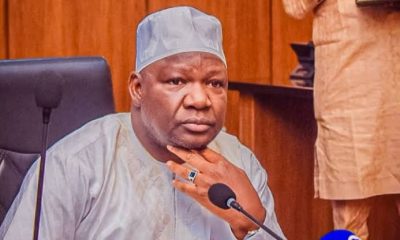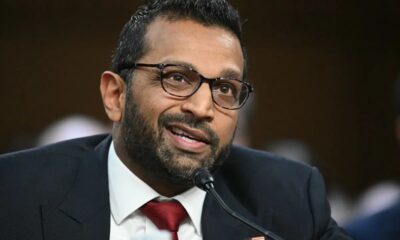Foreign
Ruling on presidential immunity a “dangerous precedent” – Biden blasts Supreme Court

By Francesca Hangeior.
President Joe Biden warned that the US Supreme Court’s landmark ruling on presidential immunity sets a “dangerous precedent” that Donald Trump would exploit if elected in November.
The conservative-dominated high court ruled that Trump — and all presidents — enjoy “absolute immunity” from criminal prosecution for “official acts” taken while in office, but can still face criminal penalties for “unofficial acts.”
“For all practical purposes today’s decision almost certainly means there are no limits to what a president can do. This is a fundamentally new principle, and it’s a dangerous precedent,” Biden said in a speech at the White House.
I want people to remember the Emirate as a symbol of dignity and peace —Film maker, Zainab Bayero0:00 / 1:00
Trump is facing criminal charges over his attempts to overturn his 2020 election loss to Biden, but that trial had been put on hold while the Supreme Court considered his immunity claims.
The 6-3 ruling on Monday, split along ideological lines, is set to further delay proceedings in that case, almost certainly to sometime after voters head to the polls in November.
“The American people must decide if they want to entrust… once again, the presidency to Donald Trump, now knowing he’ll be more emboldened to do whatever he pleases, whenever he wants to do it,” Biden said.
Conservative Chief Justice John Roberts, in his majority opinion, said a president is “not above the law” but does have “absolute immunity” from criminal prosecution for official acts taken while in office.
“The president therefore may not be prosecuted for exercising his core constitutional powers,” Roberts said.
“As for a President’s unofficial acts, there is no immunity,” the chief justice added, sending the case back to a lower court to determine which of the charges facing Trump involve official or unofficial conduct.
Trump is charged with conspiracy to defraud the United States as well as obstruction of an official proceeding — when a violent mob of his supporters tried to prevent the January 6, 2021, joint session of Congress held to certify Biden’s victory.
The 78-year-old former president is also charged with conspiracy to deny Americans the right to vote and to have their votes counted.
“The public has a right to know the answer about what happened on January 6, before they’re asked to vote again this year,” Biden said.
“Now because of today’s decision, that is highly, highly unlikely. It’s a terrible disservice to the people of this nation.”
The three liberal justices dissented from Monday’s ruling with Justice Sonia Sotomayor saying she was doing so “with fear for our democracy.”
“Never in the history of our Republic has a President had reason to believe that he would be immune from criminal prosecution if he used the trappings of his office to violate the criminal law,” Sotomayor said. “In every use of official power, the President is now a king above the law.”
“Orders the Navy’s Seal Team 6 to assassinate a political rival? Immune. Organizes a military coup to hold onto power? Immune. Takes a bribe in exchange for a pardon? Immune. Immune, immune, immune.”
Trump, in posts on Truth Social, welcomed the decision calling it a “big win for our Constitution and democracy.”
“Today’s Historic Decision by the Supreme Court should end all of Crooked Joe Biden’s Witch Hunts against me,” he said.
Steven Schwinn, a law professor at the University of Illinois Chicago, said the ruling means the case “is going to drag on more and more, and longer and longer, and well beyond the election.”
“To the extent that Trump was trying to drag his feet and extend this beyond the election, he has succeeded wildly,” Schwinn said.
Foreign
Putin announces three-day Russian ceasefire in Ukraine from 8 May

Russian President Vladimir Putin has announced a temporary ceasefire for the war in Ukraine.
The Kremlin said the ceasefire would run from the morning of 8 May until 11 May – which coincides with victory celebrations to mark the end of World War Two.
In response, Ukraine’s Foreign Minister Andrii Sybiha called for an immediate ceasefire lasting “at least 30 days”.
While US President Donald Trump, who has been attempting to broker a truce between the two sides, said he wants to see a permanent ceasefire, the White House said.
The Kremlin announced a similar, 30-hour truce over Easter, but while both sides reported a dip in fighting, they accused each other of hundreds of violations.
Ceasefires have been attempted more than 20 times in Ukraine – all of them failed eventually, and some within minutes of going into effect.
The most recent one, over Easter, was very limited in scope and only resulted in a slight reduction in fighting, with both sides accusing each other of violating the truce.
In a statement on Monday, the Kremlin said Putin declared the ceasefire “based on humanitarian considerations”.
A translation of the statement said: “Russia believes that the Ukrainian side should follow this example.
“In the event of violations of the ceasefire by the Ukrainian side, the Armed Forces of the Russian Federation will give an adequate and effective response.
“The Russian side once again declares its readiness for peace talks without preconditions, aimed at eliminating the root causes of the Ukrainian crisis, and constructive interaction with international partners.”
Following its release, Ukrainian Foreign Minister Sybiha said: “If Russia truly wants peace, it must cease fire immediately.”
“Why wait until May 8th?” he wrote on X. “If the fire can be ceased now and since any date for 30 days—so it is real, not just for a parade.”
He said Ukraine is ready to support a “lasting, durable, and full ceasefire. And this is what we are constantly proposing, for at least 30 days”.
White House press secretary Karoline Leavitt said Trump was growing “frustrated with leaders of both countries”.
“He wants to see a permanent ceasefire.
“I understand Vladimir Putin this morning offered a temporary ceasefire. The president has made it clear he wants to see a permanent ceasefire first to stop the killing, stop the bloodshed.”
The latest announcement comes during what the US has described as a “very critical” week for Russia-Ukraine peace talks.
Washington has been trying to broker a deal between the two sides, but the Donald Trump administration has threatened to pull out if they do not see progress.
Putin is keen to create the impression that Russia is serious about seeking peace – and he is keen for Trump to hear that message given Ukraine has accepted Washington’s proposal for a more lasting 30-day ceasefire.
It comes after the US president expressed annoyance with Russia’s continued attacks on Ukraine.
Russia launched a full-scale invasion of Ukraine on 24 February 2022, and currently controls about 20% Ukraine’s territory, including the southern Crimea peninsula annexed by Moscow in 2014.
It is estimated that hundreds of thousands of people – the vast majority of them soldiers – have been killed or injured on all sides since 2022.
Foreign
Massive explosion at Iran port kills at least 14 people, injures 750

A massive explosion and fire rocked a port Saturday in southern Iran purportedly linked to a shipment of a chemical ingredient used to make missile propellant, killing 14 people and injuring around 750 others.
Helicopters and aircraft dumped water from the air on the raging fire through the night into Sunday morning at the Shahid Rajaei port. The explosion occurred just as Iran and the United States met Saturday in Oman for the third round of negotiations over Tehran’s rapidly advancing nuclear program.
No one in Iran outright suggested that the explosion came from an attack. However, even Iranian Foreign Minister Abbas Araghchi, who led the talks, on Wednesday acknowledged that “our security services are on high alert given past instances of attempted sabotage and assassination operations designed to provoke a legitimate response.”
State media offered the casualty figures. But there were few details on what sparked the blaze just outside of Bandar Abbas, causing other containers to reportedly explode.
Security firm says port received chemical for missile fuel
The port took in a shipment of the missile fuel chemical in March, the private security firm Ambrey said. The fuel is part of a shipment of ammonium perchlorate from China by two vessels to Iran first reported in January by the Financial Times. The chemical used to make solid propellant for rockets was going to be used to replenish Iran’s missile stocks, which had been depleted by its direct attacks on Israel during the war with Hamas in the Gaza Strip.
“The fire was reportedly the result of improper handling of a shipment of solid fuel intended for use in Iranian ballistic missiles,” Ambrey said.
Ship-tracking data analyzed by The Associated Press put one of the vessels believed to be carrying the chemical in the vicinity in March, as Ambrey said. Iran hasn’t acknowledged taking the shipment. The Iranian mission to the United Nations didn’t respond to a request for comment on Saturday.
It’s unclear why Iran wouldn’t have moved the chemicals from the port, particularly after the Beirut port blast in 2020. That explosion, caused by the ignition of hundreds of tons of highly explosive ammonium nitrate, killed more than 200 people and injured more than 6,000 others. However, Israel did target Iranian missile sites where Tehran uses industrial mixers to create solid fuel.
Social media footage of the explosion on Saturday at Shahid Rajaei saw reddish-hued smoke rising from the fire just before the detonation. That suggests a chemical compound being involved in the blast — like in the Beirut explosion.
“Get back get back! Tell the gas (truck) to go!” a man in one video shouted just before the blast. “Tell him to go, it’s going to blow up! Oh God, this is blowing up! Everybody evacuate! Get back! Get back!”
On Saturday night, the state-run IRNA news agency said that the Customs Administration of Iran blamed a “stockpile of hazardous goods and chemical materials stored in the port area” for the blast, without elaborating.
An aerial shot released by Iranian media after the blast showed fires burning at multiple locations in the port, with authorities later warning about air pollution from chemicals such as ammonia, sulfur dioxide and nitrogen dioxide in the air. Schools and offices in Bandar Abbas will be closed Sunday as well.
Port a major destination for Iranian cargo
Shahid Rajaei has been a target before. A 2020 cyberattack attributed to Israel targeted the port. It came after Israel said that it thwarted a cyberattack targeting its water infrastructure, which it attributed to Iran. Israeli officials didn’t respond to requests for comment regarding Saturday’s explosion.
Social media videos showed black billowing smoke after the blast. Others showed glass blown out of buildings kilometers, or miles, away from the epicenter of the explosion. State media footage showed the injured crowding into at least one hospital, with ambulances arriving as medics rushed one person by on a stretcher.
Hasanzadeh, the provincial disaster management official, earlier told state television that the blast came from containers at Shahid Rajaei port in the city, without elaborating. State television also reported that there had been a building collapse caused by the explosion, though no further details were offered.
The Interior Ministry said that it launched an investigation into the blast. Iranian President Masoud Pezeshkian also offered his condolences for those affected in the blast.
Shahid Rajaei port in Hormozgan province is about 1,050 kilometers (650 miles) southeast of Iran’s capital, Tehran, on the Strait of Hormuz, the narrow mouth of the Persian Gulf through which 20% of all oil traded passes.
Foreign
Judge halts Trump’s shutdown of Voice of America

A federal judge has ordered the Trump administration to restore all jobs and funding for the Voice of America and other US-backed news outlets, ruling that efforts to dismantle it violated the law and Constitution.
Over 1,300 VOA employees, including about 1,000 journalists, were placed on leave following President Donald Trump’s order. The White House has accused the broadcaster of being “anti-Trump” and “radical”.
VOA, still primarily a radio service, was set up during World War II to counter Nazi propaganda, and has become a major global media broadcaster.
The ruling noted that because of the cuts, “VOA is not reporting the news for the first time in its 80-year existence”.
Judge Royce Lamberth said the administration acted “without regard to the harm inflicted on employees, contractors, journalists, and media consumers around the world”.
He ordered the administration to take steps to restore employees and contractors to the jobs they had prior to the executive order, and to do the same for Radio Free Asia and the Middle East Broadcasting Networks.
The judge found the administration also likely violated the International Broadcasting Act and Congress’ power to appropriate funding.
“My colleagues and I are grateful for this ruling. But we know that this is just a small step forward, as the government is likely to appeal,” said Patsy Widakuswara, the VOA White House bureau chief and a lead plaintiff in the lawsuit.
“We are committed to continuing to fight against what we believe is the administration’s unlawful silencing of VOA until we can return to our congressional mandate: to tell America’s stories with factual, balanced, and comprehensive, reporting,” she said.
Trump has long criticised VOA as part of his broader attacks against the media, frequently accusing mainstream outlets of bias.
After taking office in January, he appointed a political ally, Kari Lake, to run VOA. Lake has previously supported Trump’s false claims that the 2020 election was stolen from him.
In March, Trump ordered the US Agency for Global Media (USAGM), which oversees VOA and funds outlets like Radio Free Europe and Radio Free Asia, to be “eliminated to the maximum extent consistent with applicable law”.
A separate judge in New York temporarily blocked the executive order after journalists, advocacy groups and unions sued, arguing the move was unlawful.
Judge Lamberth, who is based in Washington, DC, ruled the Trump administration lacked the authority to shutter VOA, which is funded by Congress and has a legislative mandate to deliver credible news globally.
“It is hard to fathom a more straightforward display of arbitrary and capricious actions than the Defendants’ actions here,” he wrote.
“Even though several courts have ruled that the President can remove personnel and terminate grants, a radical district judge is once again attempting to interfere with the Trump Administration’s efforts to make the government more efficient,” White House spokesperson Taylor Rogers said in a statement.
USAGM did not immediately respond to a request for comment.
-

 News10 hours ago
News10 hours agoInsecurity: BUDA urges govt to quickly rescue Baruten from terrorists
-

 News16 hours ago
News16 hours agoJust in: Senator Natasha tenders satirical ‘apology’ to Akpabio
-

 News12 hours ago
News12 hours agoUNUSUAL! Without invitation, Police declared me wanted — Daughter of ABC Transport owner
-

 News7 hours ago
News7 hours agoBreaking: Late gospel singer Osinachi’s husband sentenced to death by hanging
-

 News8 hours ago
News8 hours agoWeeks to 2nd anniversary, Niger deputy gov, plans to resign, move out personal effects
-

 Metro17 hours ago
Metro17 hours ago‘My husband always makes love throughout the night until morning’ – Woman Wants Divorce
-

 News13 hours ago
News13 hours agoGov Oborevwori’s top aide suddenly resigns from govt
-

 Entertainment11 hours ago
Entertainment11 hours agoMy tongue slipped, Annie Macaulay apologizes after referring to Herself as ‘Idibia’ at Headies 2025

















